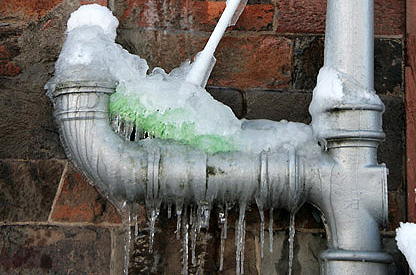Key Approaches for Avoiding Frozen Pipes in Winter
Key Approaches for Avoiding Frozen Pipes in Winter
Blog Article
The article down below involving Prevent Frozen Pipes is unquestionably engaging. You should take a peek.

Winter can damage your pipes, particularly by freezing pipes. Here's exactly how to avoid it from happening and what to do if it does.
Intro
As temperatures decline, the threat of frozen pipelines boosts, possibly leading to pricey fixings and water damage. Comprehending just how to avoid frozen pipes is vital for house owners in cold environments.
Prevention Tips
Insulating prone pipes
Cover pipes in insulation sleeves or use warmth tape to shield them from freezing temperature levels. Concentrate on pipes in unheated or external locations of the home.
Home heating techniques
Keep interior rooms appropriately heated up, specifically locations with pipes. Open up cupboard doors to enable cozy air to distribute around pipelines under sinks.
How to determine frozen pipelines
Search for lowered water flow from taps, unusual smells or sounds from pipelines, and noticeable frost on revealed pipelines.
Long-Term Solutions
Structural modifications
Think about rerouting pipes away from outside walls or unheated areas. Add additional insulation to attic rooms, basements, and crawl spaces.
Updating insulation
Buy premium insulation for pipelines, attic rooms, and wall surfaces. Proper insulation aids maintain regular temperature levels and lowers the threat of frozen pipes.
Shielding Outside Plumbing
Garden tubes and exterior taps
Disconnect and drain pipes yard hose pipes before winter. Mount frost-proof spigots or cover exterior taps with insulated caps.
Understanding Frozen Pipes
What triggers pipelines to ice up?
Pipelines freeze when exposed to temperature levels below 32 ° F (0 ° C) for expanded periods. As water inside the pipes ices up, it broadens, putting pressure on the pipeline wall surfaces and possibly causing them to break.
Risks and problems
Frozen pipelines can bring about water supply disturbances, home damages, and costly repairs. Ruptured pipes can flood homes and create substantial architectural damage.
Signs of Frozen Water Lines
Determining frozen pipes early can prevent them from bursting.
What to Do If Your Pipes Freeze
Immediate activities to take
If you think icy pipes, keep faucets available to alleviate pressure as the ice melts. Utilize a hairdryer or towels taken in hot water to thaw pipes slowly.
Verdict
Stopping frozen pipes requires positive actions and quick responses. By recognizing the causes, indicators, and preventive measures, house owners can shield their plumbing during cold weather.
Helpful Tips to Prevent Frozen Pipes this Winter
UNDERSTANDING THE BASICS: WHY PIPES FREEZE AND WHY IT’S A PROBLEM
Water freezing inside pipes is common during the winter months, but understanding why pipes freeze, and the potential problems it can cause is crucial in preventing such incidents. This section will delve into the basics of why pipes freeze and the associated problems that may arise.
THE SCIENCE BEHIND FROZEN PIPES
When water reaches freezing temperatures, it undergoes a physical transformation and solidifies into ice. This expansion of water as it freezes is the primary reason pipes can burst. As the water inside the pipe freezes, it expands, creating immense pressure on the walls. If the pressure becomes too great, the pipe can crack or rupture, leading to leaks and water damage.
FACTORS THAT CONTRIBUTE TO PIPE FREEZING
Low Temperatures: Extremely cold weather, especially below freezing, increases the risk of pipes freezing. Uninsulated or Poorly Insulated Pipes: Pipes located in unheated areas, such as basements, crawl spaces, or attics, are more prone to freezing. Insufficient insulation or lack of insulation altogether exacerbates the problem. Exterior Wall Exposure: Pipes running along exterior walls are susceptible to freezing as they encounter colder temperatures outside. Lack of Heating or Temperature Regulation: Inadequate heating or inconsistent temperature control in your home can contribute to frozen pipes. PROBLEMS CAUSED BY FROZEN PIPES
- Pipe Bursting: As mentioned earlier, the expansion of water as it freezes can cause pipes to burst, resulting in significant water damage.
- Water Damage: When pipes burst, it can lead to flooding and water damage to your property, including walls, ceilings, flooring, and personal belongings.
- Structural Damage: Prolonged exposure to water from burst pipes can compromise the structural integrity of your home, leading to costly repairs.
- Mold and Mildew Growth: Excess moisture from water damage can create a favorable environment for mold and mildew growth, posing health risks to occupants.
- Disrupted Water Supply: Frozen pipes can also result in a complete or partial loss of water supply until the issue is resolved.
WHY CERTAIN PIPES ARE MORE PRONE TO FREEZING
- Location: Pipes located in unheated or poorly insulated areas, such as basements, crawl spaces, attics, or exterior walls, are at higher risk of freezing.
- Exterior Pipes: Outdoor pipes, such as those used for irrigation or exposed plumbing, are particularly vulnerable to freezing as they are directly exposed to the elements.
- Supply Lines: Pipes that carry water from the main water supply into your home, including the main water line, are critical to protect as freezing in these lines can affect your entire plumbing system.
- Underground Pipes: Pipes buried underground, such as those connected to sprinkler systems or outdoor faucets, can be susceptible to freezing if not properly insulated.
https://busybusy.com/blog/helpful-tips-to-prevent-frozen-pipes-this-winter/

I have been very inquisitive about Winter Plumbing Precautions: Preventing Frozen Pipes and I am praying you enjoyed the entire article. Sharing is nice. You never know, you could be doing someone a favor. Bless you for your time. Revisit us soon.
Request A Quote Report this page